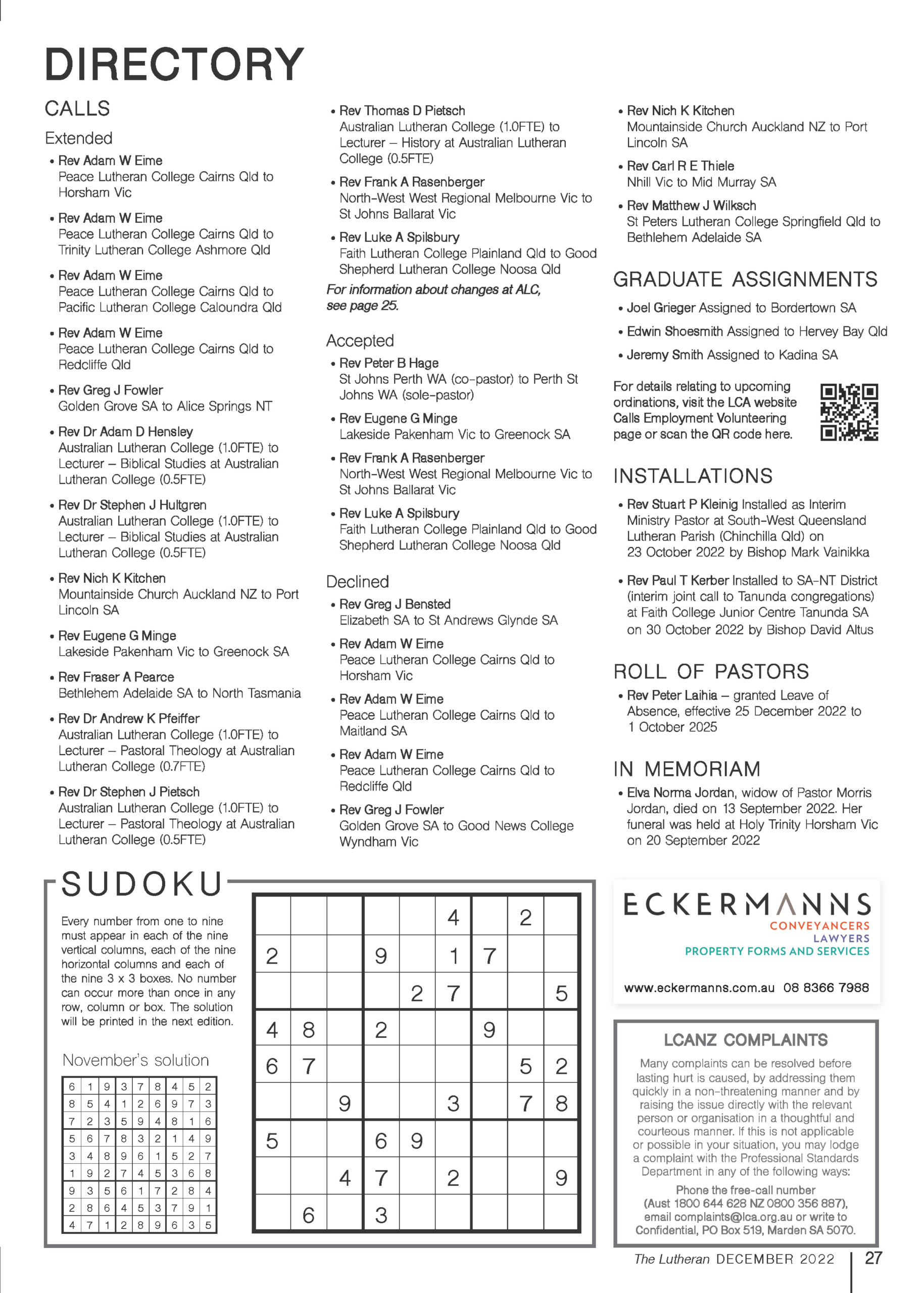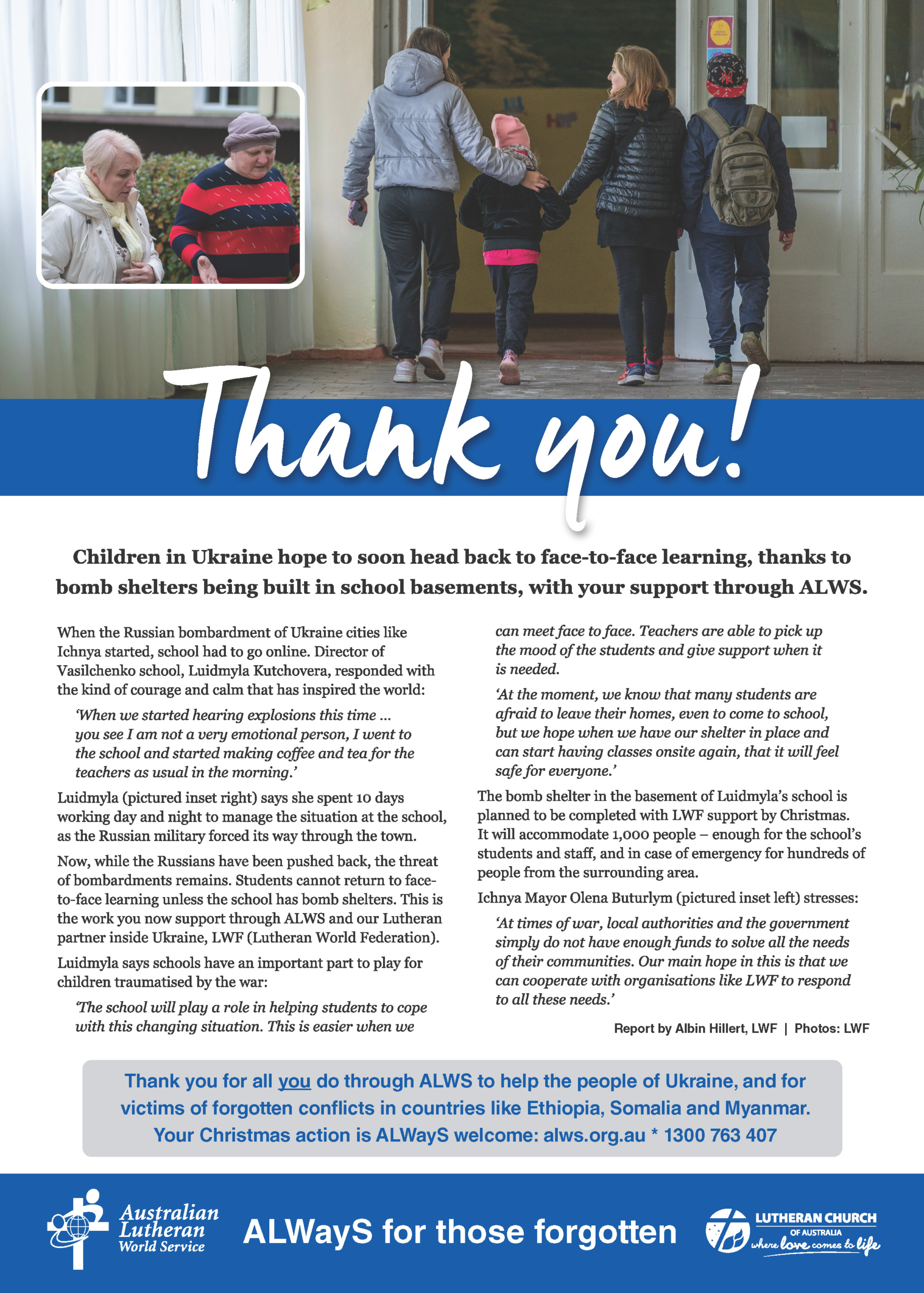Members of St Paul’s Lutheran Church Choir Shepparton in Victoria have seen the extremes of Australia’s climate in recent months. The choir’s members, who are originally from African nations including the Democratic Republic of the Congo, Burundi and South Sudan, left the flooding Goulburn Valley where they live to head for the dusty outback of Central Australia. There the choir, which sings in Kiswahili, Kirundi and English, collaborated with fellow Lutherans from the Central Australian Aboriginal Women’s Choir at the 10-day Desert Song Festival in and around Alice Springs. The Central Australian Aboriginal Women’s Choir, whose members are from Hermannsburg and other remote Indigenous communities in the Northern Territory, sing in English, Western Arrarnta and Pitjantjatjara, and will tour Brisbane, Sydney and Melbourne this month.
‘The church has left the building.’ That was the message – and challenge – from Pastor Nathan Hedt to those at the LCANZ’s inaugural online Digital Mission and Ministry Forum (DMMF) last month.
The LCANZ’s New and Renewing Churches pastor told those who attended the forum held on the Zoom platform that technological advancements, combined with the limitations of the COVID-19 pandemic, presented new mission opportunities. ‘We don’t just go to church; we are the church. We are the body of Christ’, Pastor Nathan, who presented at the day-long conference, said. ‘Thanks to the possibilities of the digital world, and the pandemic, the church has left the building.’
There were 125 registrations for the forum from across Australia and New Zealand and from as far away as Japan and Africa. Session topics included online worship, online evangelism, and online discipleship.
Lutheran Media Director Richard Fox said the digital world enabled God’s love to reach millions who may never walk into a church building. ‘To hear how we can connect and build relationships in Jesus Christ with millions of people through the latest technologies is inspiring’, he said. ‘What an amazing opportunity we have been given to reach people with the hope of Jesus Christ.’
LCANZ Local Mission Executive Officer Dr Tania Nelson said forum participants were encouraged to ‘keep adapting’, which reminded her of a quote from US theologian Tod Bolsinger. ‘He said: “To live up to their name, local churches must be continually moving out, extending themselves into the world, being the missional, witnessing community we were called … to be: the manifestation of God’s going into the world.”’
The DMMF planning team will review forum feedback and consider future digital mission events and opportunities.
Not a subscriber? Click here to receive stories & upcoming issues in full
In the first conference of its kind, 20 German Lutheran pastors and ministry workers who serve congregations in Australia met in Adelaide recently.
The EKiA, or the Evangelische Kirche in Australien, is a collaboration of Lutheran congregations with German-language services and ministries across New South Wales, Victoria, South Australia and Western Australia. Some of these congregations are part of the German Lutheran Church EKD (Evangelische Kirche in Deutschland), some are independent, while others are German-language ministries connected to LCA congregations. There is an agreement of altar and pulpit fellowship between the EKD and the LCA.
The five-day conference in mid-October provided ‘a very fruitful and insightful space for exchange, encouragement and learning from each other’, said Maria Rudolph, who leads the German-language services and ministry at St John’s Lutheran Church in Perth. ‘We were doubly blessed by the presence of EKD Bishop Ute Hedrich and LCA representatives Dr Tania Nelson, the executive officer for Local Mission, and Craig Heidenreich, the Cross-Cultural Ministry facilitator, who enriched our sessions greatly.’
Gerhard Ruediger of the Evangelical German Language Congregation in South Australia said Tania also highlighted the Memoranda of Understanding between the LCA and EKD, reaffirmed in 2001, for the mutual recognition and support of German-language ministry in Australia.
Not a subscriber? Click here to receive stories & upcoming issues in full

Not a subscriber? Click here to receive stories & upcoming issues in full

Not a subscriber? Click here to receive stories & upcoming issues in full

Not a subscriber? Click here to receive stories & upcoming issues in full

Not a subscriber? Click here to receive stories & upcoming issues in full

Not a subscriber? Click here to receive stories & upcoming issues in full
Some of the biggest names in the Bible lived with disabilities. From Moses’ stutter to Saint Paul’s unnamed ‘thorn in the flesh’, Scripture has plenty of examples of God working through what was seen as ‘human weakness’.
And, of course, God’s glory and love shone brightly when Jesus’ miracles brought into the spotlight people who had been ignored, belittled, shunned and left destitute by society because they could not see, hear, speak or walk. Jesus not only straightened the mason’s ‘withered’ hand in the synagogue on the Sabbath (Matthew 12:9–13, Mark 3:1–6, and Luke 6:6–11), he also restored his dignity and livelihood.
Unlike religious, government and business authorities of his day, when Jesus met a person with a disability, he saw the whole person. The fact that he ‘saw’ them at all set him apart. He loved them just as he loved his disciples and loves each of us, with our varying abilities and disabilities. Because society ostracised and failed to care for people living with disability, Jesus knew they were suffering and wanted them to live their best lives. His prayer for everyone in 2022 is the same. As he says in John’s Gospel (10:10b), ‘I have come that they may have life, and have it to the full’.
That’s why the accommodation, in-home and day-centre services and employment and training programs facilitated by churches, government, charitable, and aid and development organisations who work alongside people living with disability are important. Overall, they aim to remove barriers to independence and self-determination and replace them with opportunity and self-worth.
Among our Lutheran family, we have agencies whose staff, volunteers and supporters know the joys of serving with people who live with disability, and the challenges of a world which still excludes and devalues people, based on physical, mental and intellectual attributes. These agencies include Lutheran Services and Anuha in Queensland, and Lutheran Disability Services (LDS) and Elcies Disability Care (Lutheran Care) in South Australia. In addition, LCA International Mission and Australian Lutheran World Service support people internationally through their partnerships and programs.
We are excited to share a raft of stories from those who serve and live in this space, including thoughts on how our churches can be more inclusive of people living with disabilities. (Personally, I experience an extra dose of joy from the privilege of worshipping in a congregation with LDS clients and carers.)
As well as our regular columns, news, views and resources from around the church, our print subscribers will find a bonus copy of Border Crossings from LCA International Mission inside (digital subscribers can head to https://lcamission.org.au to access a digital copy under the Resources tab).
I pray that you’ll be blessed by your reading.
Lisa
Not a subscriber? Click here to receive stories & upcoming issues in full
Bishop Paul’s letter
Rev Paul Smith
Bishop, Lutheran Church of Australia and New Zealand
I watched our new King Charles dwell silently and pensively with the words of the anthem during his dear mother’s funeral, ‘God save our King’. Throughout his life, he had been praying ‘God save the Queen’.
Charles has taken up the work of monarch of the Commonwealth, in the wake of seven decades of extraordinary servant leadership. But an outstanding tradition that he follows from Her Majesty Queen Elizabeth II, is her Christian witness as a head of state in our modern world.
Young Princess Elizabeth was baptised into Christ in the chapel at Buckingham Palace in 1926 and was confirmed and married in the Church of England. Throughout their lives, ever in the public eye, Queen Elizabeth and her beloved husband Prince Philip served as a faithful Christian couple. Upon her accession to the throne in 1952, she became the head of the Church of England and was its longest-serving supreme governor.
In her first Christmas broadcast after her father King George VI had died in 1952, Elizabeth spoke of her own prayerful yearning, ‘Pray for me … that God may give me wisdom and strength to carry out the solemn promises I shall be making, and that I may faithfully serve him and you, all the days of my life’.
This was a yearning she ever continued throughout her 70 years of service as Queen of both Australia and New Zealand, as she lived by faith under a very public scrutiny. She worked with 15 British Prime Ministers and nearly 200 different Heads of State in the various places of the Commonwealth.
As we entered the new millennium in the year 2000, Elizabeth took the opportunity to share a deeply personal witness to her own walk with the Lord Jesus Christ. In her Christmas broadcast that year, she said, ‘For me, the teachings of Christ and my own personal accountability before God provide a framework in which I try to lead my life. I, like so many of you, have drawn great comfort in difficult times from Christ’s words and example’.
At the same time Elizabeth has been praying, we have been praying for her. Many of the readers of The Lutheran in New Zealand and Australia will remember school days singing ‘God save the Queen’ before class every day. This anthem is a prayer, asking God to guide and bless the leader of our countries. God has answered Elizabeth’s prayer and our prayers for her.
At Her Majesty’s funeral, the preacher, Archbishop Justin Welby, left the listener in no doubt regarding Elizabeth’s walk by faith. He concluded his message with an invitation for listeners to take up the hope that is the gospel of Jesus Christ.
Archbishop Welby proclaimed, ‘Her Late Majesty’s broadcast during COVID lockdown ended with: “We will meet again”, words of hope from a song of Vera Lynn. Christian hope means certain expectation of something not yet seen. Christ rose from the dead and offers life to all, abundant life now and life with God in eternity. As the Christmas carol says, “where meek souls will receive him, still the dear Christ enters in”. We will all face the merciful judgement of God: we can all share the Queen’s hope which in life and death inspired her servant leadership. Service in life, hope in death. All who follow the Queen’s example, and inspiration of trust and faith in God, can with her say: “We will meet again”.’
Our two nations have paused to express our thanksgiving to God, for the life and witness of Her Majesty, Queen Elizabeth II. As Christian people of this Commonwealth, we commit ourselves to praying for Charles III and all our leaders, both in our private prayers and in the liturgies of our congregations and Lutheran communities.
God save our gracious King.
In Christ,
Paul
Lord Jesus, we belong to you,
you live in us, we live in you;
we live and work for you –
because we bear your name.
Not a subscriber? Click here to receive stories & upcoming issues in full
GET IN TOUCH
197 Archer Street
North Adelaide SA 5006
Editor Lisa
0409 281 703
Email Lisa

